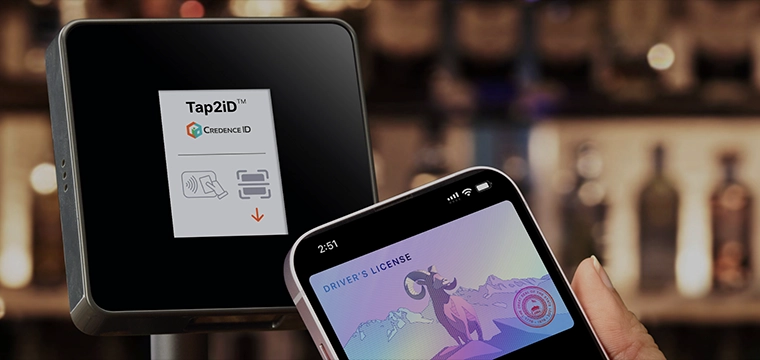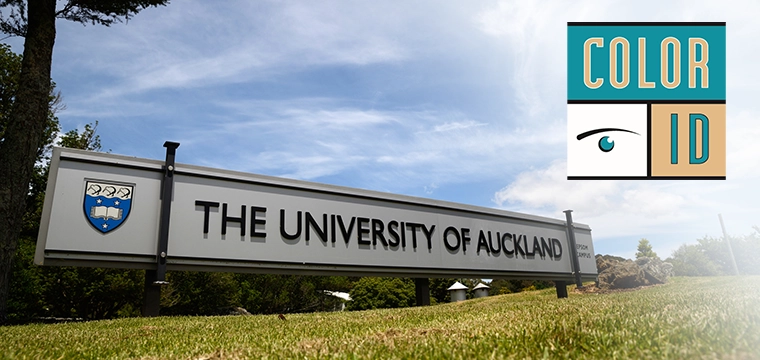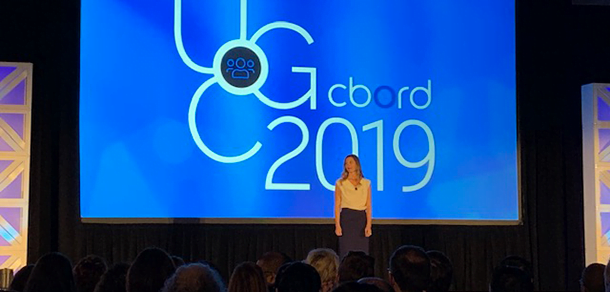
CR80News was onsite at the 40th annual CBORD User Group Conference (UGC 2019) this week. There were many highlights, great educational sessions, and a packed technology exhibit hall. Here are a few of the highlights.
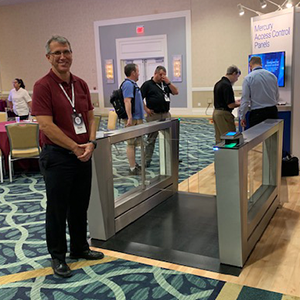 The sleek and secure turnstile from Smarter Security equipped with IDEMIA’s MorphoWave hand scanner was a hit with UGC attendees. The stainless steel and glass unit would look great in any high-end facility. It features anti-tailgating sensors with various alarms to warn staff of suspicious activity. According to Dave Beckwith, CBORD's product manager for integrated security, the primary use case is all-you-can-eat dining facilities. New firmware updates to the MorphoWave biometric scanner increase throughput by 20% and raise the number of patrons that can be enrolled in the unit from 20,000 to 100,000. The system is fully integrated with CBORD’s CSGold platform.
The sleek and secure turnstile from Smarter Security equipped with IDEMIA’s MorphoWave hand scanner was a hit with UGC attendees. The stainless steel and glass unit would look great in any high-end facility. It features anti-tailgating sensors with various alarms to warn staff of suspicious activity. According to Dave Beckwith, CBORD's product manager for integrated security, the primary use case is all-you-can-eat dining facilities. New firmware updates to the MorphoWave biometric scanner increase throughput by 20% and raise the number of patrons that can be enrolled in the unit from 20,000 to 100,000. The system is fully integrated with CBORD’s CSGold platform.
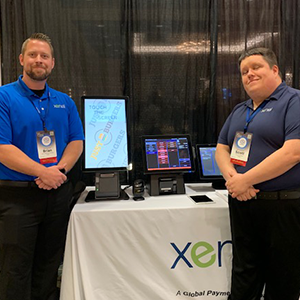 Nextep Systems showcased a series of kiosks for ordering and payment for CBORD food service locations. According to Brian Machiniak, Senior Relationship Manager for Nextep Systems, “self-service at the university level is a demand now.” The company’s range of self-order solutions support multiple methods for order and pay, and Machiniak stresses that flexibility is key because even on the same campus different dining operations require different setups. Nextep has been building self-service kiosks for 15 years, and Machiniak says clients typically see a 15% increase in the average ticket price due to the up-sell capabilities of the devices. Nextep Systems is part of the Xenial group of companies owned by Global Payments.
Nextep Systems showcased a series of kiosks for ordering and payment for CBORD food service locations. According to Brian Machiniak, Senior Relationship Manager for Nextep Systems, “self-service at the university level is a demand now.” The company’s range of self-order solutions support multiple methods for order and pay, and Machiniak stresses that flexibility is key because even on the same campus different dining operations require different setups. Nextep has been building self-service kiosks for 15 years, and Machiniak says clients typically see a 15% increase in the average ticket price due to the up-sell capabilities of the devices. Nextep Systems is part of the Xenial group of companies owned by Global Payments.
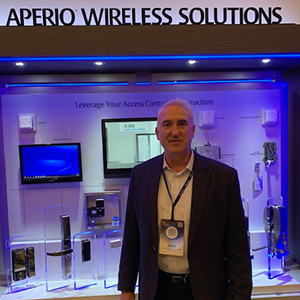 At the CBORD UGC event, Assa Abloy showed a compact version of its Aperio wireless locks that connect to mailboxes. The solution enables campuses to distribute mail to a secured box in a bank of mailboxes and restrict access to only the appropriate student ID card. Jim Primovic, Assa Abloy’s Director of Sales for Campus Electronic Access Control, demonstrated the solution and hinted at a major campus installation underway now.
At the CBORD UGC event, Assa Abloy showed a compact version of its Aperio wireless locks that connect to mailboxes. The solution enables campuses to distribute mail to a secured box in a bank of mailboxes and restrict access to only the appropriate student ID card. Jim Primovic, Assa Abloy’s Director of Sales for Campus Electronic Access Control, demonstrated the solution and hinted at a major campus installation underway now.
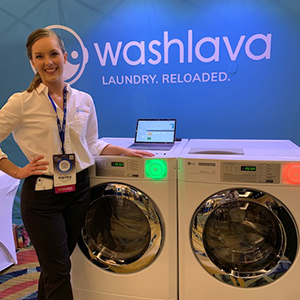 It looks like a glowing hockey puck affixed to a washer or dryer, but the Washlava device indicates when the machine is available, in use, or reserved by another user. Students interact with the laundry solution via a mobile app, reserving and paying for cycles. If they are standing in front of a machine, Bluetooth communication from their phone to the puck handles the transaction. They can also use the app to reserve a machine from their dorm or other location, locking it down for a specific number of minutes. According to Washlava's Hailey Hendrickson, MIT students pay for laundry cycles using their ID card's TechCash via MIT's CBORD system.
It looks like a glowing hockey puck affixed to a washer or dryer, but the Washlava device indicates when the machine is available, in use, or reserved by another user. Students interact with the laundry solution via a mobile app, reserving and paying for cycles. If they are standing in front of a machine, Bluetooth communication from their phone to the puck handles the transaction. They can also use the app to reserve a machine from their dorm or other location, locking it down for a specific number of minutes. According to Washlava's Hailey Hendrickson, MIT students pay for laundry cycles using their ID card's TechCash via MIT's CBORD system.
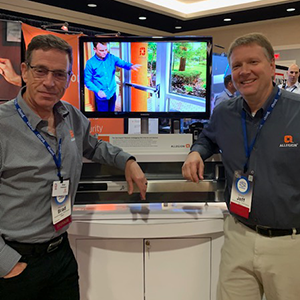 Crash bars are the metal locking mechanisms that span the width of many public access perimeter doors. Von Duprin is an industry leading provider of crash bars supplying 70% of the units in the higher education market, says Jeff Koziol, business development manager, campus software partner at Allegion. Allegion developed a retrofit kit for the popular crash bar that greatly improves campus safety. In normal operation, a staff person visits these doors and unlocks them so that students have unfettered access during normal operating hours. This unlocking process is known as “dogging” the doors. At the end of the day, the staff member goes back and “undogs” the doors, returning them to their locked state. Access control readers then require card access for entry. With the Allegion retrofit kit, Koziol explains that the undogging process can be automated such that many doors can be relocked from a central location. CBORD has integrated this new Allegion feature into CSGold.
Crash bars are the metal locking mechanisms that span the width of many public access perimeter doors. Von Duprin is an industry leading provider of crash bars supplying 70% of the units in the higher education market, says Jeff Koziol, business development manager, campus software partner at Allegion. Allegion developed a retrofit kit for the popular crash bar that greatly improves campus safety. In normal operation, a staff person visits these doors and unlocks them so that students have unfettered access during normal operating hours. This unlocking process is known as “dogging” the doors. At the end of the day, the staff member goes back and “undogs” the doors, returning them to their locked state. Access control readers then require card access for entry. With the Allegion retrofit kit, Koziol explains that the undogging process can be automated such that many doors can be relocked from a central location. CBORD has integrated this new Allegion feature into CSGold.
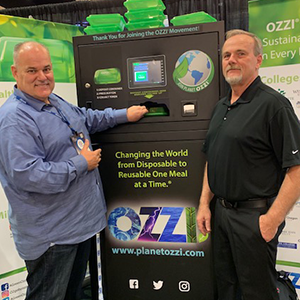 Around the world and on our campuses, the war against single use plastic is being waged. To-go containers from campus dining locations are a prime campus target. OZZI’s system of reusable containers and collection kiosks is already helping 90 colleges and universities eliminate waste and save money. “One OZZI container can replace 300 single use containers,” says Tom Wright, OZZI CEO. “An OZZI container costs less than $5 while each single use container costs 20-30 cents.” Campuses save money and help the environment. Typically a student redeems a token for a clean container and receives a token back when they return a dirty container to an OZZI kiosk. At the UGC event, OZZI demonstrated how CBORD has created a virtual token stored in the student card system, eliminating the need to keep track of physical tokens.
Around the world and on our campuses, the war against single use plastic is being waged. To-go containers from campus dining locations are a prime campus target. OZZI’s system of reusable containers and collection kiosks is already helping 90 colleges and universities eliminate waste and save money. “One OZZI container can replace 300 single use containers,” says Tom Wright, OZZI CEO. “An OZZI container costs less than $5 while each single use container costs 20-30 cents.” Campuses save money and help the environment. Typically a student redeems a token for a clean container and receives a token back when they return a dirty container to an OZZI kiosk. At the UGC event, OZZI demonstrated how CBORD has created a virtual token stored in the student card system, eliminating the need to keep track of physical tokens.
